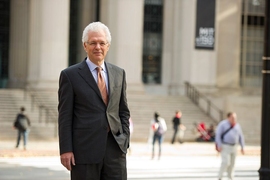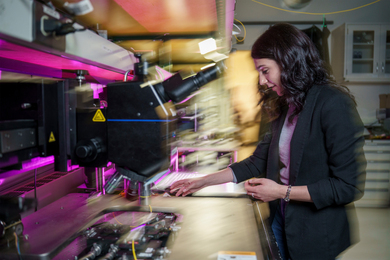A new partnership between MIT and Katholieke Universiteit Leuven (KU Leuven) in Flanders, Belgium, seeks to build bridges between researchers at both institutions, and between the Dutch and French-speaking regions of Belgium.
The five-year partnership will create additional internship and research opportunities for MIT students within KU Leuven’s 34 departments and six interdisciplinary institutes, as well as establish a new Global Seed Fund grant program to support early-stage collaborations between MIT and KU Leuven researchers. Operated through the MIT International Science and Technology Initiatives (MISTI), the new Global Seed Fund grant will provide up to $30,000 in financial support to fund travel costs incurred during international research initiatives. Calls for proposals are now open, and the application deadline is Sept. 17.
The new partnership creates “a lever to more institution-to-institution type of collaboration,” says Luc Sels, rector of KU Leuven. “That’s what I find so important. It no longer depends on the individual ties between people who already know each other, but it creates a platform in which promising researchers and ambitious students can participate.”
An historic agreement
The new partnership also has broader diplomatic implications, says Vincent Blondel, rector of the Université catholique de Louvain (UCL) in Louvain-la-Neuve. UCL, which is a valued partner of MIT-Belgium, has sponsored its own seed grants since 2011 UCL is the largest French-speaking university in Belgium, while KU Leuven is the largest Dutch-speaking university.
For centuries, both institutions were part of the country’s first university — the Universitas Lovaniensis. UCL and KU Leuven established independent institutions in 1968. The MIT-Belgium partnership marks the first joint international project involving both institutions since the split. The signing, which took place at MIT on March 9, was attended by Sels, Blondel, and MIT associate provost Richard K. Lester. It marked the first time since the 1960s that rectors from both Belgian institutions have cooperated on an official joint visit overseas.
“This is something that we do together after half a century of separation,” Blondel says. “It has a very strong symbolic energy.”
Molly Schneider, managing director of MISTI’s France and Belgium programs, says that the MIT-KU Leuven partnership was made possible through innovative leadership spearheaded by key stakeholders within both institutions. KU Leuven’s robust research facilities, interdisciplinary centers, and its position as one of the world’s premier institutions in science, engineering, technology, and biomedical studies make the school an intuitive partner for MIT. She considers the new partnership as “a natural and strategic step” towards supporting existing relationships between collaborators in Cambridge and Flanders, and broadening those opportunities.
“This agreement will allow us to support intellectual collaboration between MIT researchers and partners at KU Leuven, and to increase student mobility,” Schneider says. “This is a mutually beneficial partnership at every level, and would not have been possible without critical support and visionary leadership from our partners at KU Leuven.”
Belgium and beyond
Luc Sels says that the partnership strengthens individual international ties already established by researchers within both institutions, and provides a centralized channel for connecting potential new collaborators with similar areas of interest. KU Leuven’s strategic research centers that focus on biotechnology, energy, and nanotechnology, along with its relationships with science and tech industry leaders like Samsung, Intel, and Sony, also bolster collaboration potential for researchers in the United States and Europe.
“We are very happy that the agreement is now signed and now we can really start working and implementing things,” Sels says. “We are really thrilled.”
He adds that Belgium’s geographic position close to intellectual capitals like Amsterdam, London, Paris, and Strasbourg, also offer unique opportunities for students and MIT faculty to work with pioneers from a broad range of scientific and cultural backgrounds.
Belgium’s position as an epicenter of innovation is one of many reasons why Cathy Culot has spent the past 15 years creating opportunities for MIT students within the country. Culot is a lecturer in the MIT Global Studies and Languages department and co-director of MIT-Belgium, a program that has placed students in summer internship and research positions since 2009. Culot has been instrumental in building much of the MIT-Belgium Program from the ground up, and says that the new landmark partnership will provide new opportunities for MIT students and is a conscious step towards making Belgium’s motto, Unity makes strength, a living reality.
“This partnership definitely embodies this principle,” Culot says.
Lester, who oversees MIT’s international activities, views the partnership as “a terrific example” of how MISTI is expanding the Institute’s global engagement to benefit both students and faculty, and helping to keep international education opportunities at the core of MIT’s institutional strategy. As the new Global Seed Fund grant gets further underway and with calls for joint project proposals opening this past week, Lester expects to see global engagement flourish even more.
“My expectation and hope is that expansion will continue,” he says. “There’s such a long history of MIT engagement in Belgium with MIT researchers and academics. This agreement will help to reinforce what has been a very productive and important relationship for us.”
MISTI, a part of the Center for International Studies, is a program at the School of Humanities, Arts, and Social Sciences.










